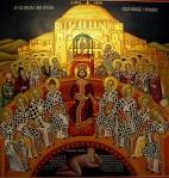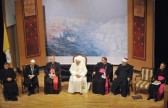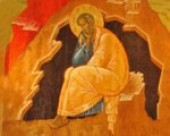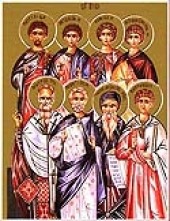By Father Dumitru Staniloae
(in “Orthodox Spirituality” @St. Tikhon’s Seminary Press)
Orthodox spirituality has as its goal the deification of man and his union with God, without being merged with Him. It has as a basic conviction the existence of a personal God, who is the supreme source of radiating love. He prizes man and doesn’t want to confuse him with Himself, but maintains and raises him to an eternal dialogue of love.
Such a spirituality has no place where an evolutionary progress of man, connected to a divinity conceived as an impersonal essence, is affirmed. This progress can have no result other than man’s disappearance in the impersonal divinity.
But the personal God, and thus the supreme source of love, can’t be conceived of as a single person, but as a community of persons in a perfect unity. You see then why the Christian teaching of a Trinity of Persons in a unity of essence is the only one which can constitute the basis of a perfect spirituality for man, understood as a full communion with God in love, without his being lost in it.
A Roman Catholic theologian, Georg Koepgen has best described the Trinitarian basis of Christian spirituality. [All the references in this chapter to Georg Koepgen are taken from the Introduction to his book, Die Gnosis des Christentums, 1st ed. (Salzburg, 1939)]. At the same time he says that this spirituality has been most faithfully preserved in the Eastern Church, because she alone has kept in the most unchanged way the biblical teaching about the Holy Trinity and its central place in Christian piety. He establishes that, in religions which unilaterally accentuate monotheism, such a spirituality has no place; and in those with a pantheistic tendency, even if the divinity is manifested in a plurality of gods as expressions of the forces of nature, we find a false spirituality, or an illusory perfection, in other words, one which leads basically to man’s meltdown in the so-called divinity.
On the other hand, man’s personal spiritual perfection, by eternal unconfused union with God can’t take place except where an eternal eschatology of man, in blessed union with God, is believed in. But such an eschatology is the result of the Trinitarian God.
Man’s union with God for eternity, however, is guaranteed and mediated only where one of the divine persons takes flesh as a man for eternity, thus showing the eternal love of God for man as man. Koepgen considers that Orthodoxy has maintained the spirituality proper to the Christianity revealed in Christ; it has kept the mystery of the Trinitarian community of persons in God, unweakened by a rationalistic philosophy which, accentuating the unity of God has emphasized His essence. We can add that precisely because of this rational stress on the one essence of God, which tries to avoid its paradoxical combination with the Trinity of Persons, the doctrine of the “Filioque” resulted. According to this teaching the Spirit proceeds from what the Father and the Son have in common, that is from the divine essence; and so the essence is considered to be the cause of the persons, which actually leads to an impersonal god, to a pantheist one.
But let’s give the floor to Koepgen:
Mysticism always has a single goal: man’s deification and union with God, without man’s fusion with Him. And this can’t be understood except by the Trinitarian idea of God. In Christianity the whole is oriented of necessity toward future perfection …. The Church is blamed because it recognizes mysticism, and is also condemned without mercy when it crosses the border into pantheism. But how can mysticism be recognized, if pantheism is rejected? Note our answer: Christian mysticism isn’t based on man’s predisposition, which pushes him into a fusion with the divinity, into a pantheist life of union with it, but it is the actualization of the incarnation of God in the believer. Between the Christian concept of God and the non-Christian, there is a fundamental distinction: Christianity is based on the Trinitarian God [therefore irreducible and eternally personal, or a personal community], not on a philosophical concept of an absolute spirit [and as such so impersonal]. It’s noteworthy that Catholic theology too works almost exclusively with the philosophical concept of God, by which it avoids referring directly to the Trinity [of persons].
The God of the New Testament and of the holy Eastern Fathers is living and irreducibly three in one. The God of scholastic philosophy is impregnated with Aristotelianism or confused with a generally pantheistic one. We would say that the failure of scholastic theologians to make this distinction has led them to use the same name of mysticism to express the union of the Christian with God, a term also employed by pantheist philosophy. So Protestant theologians heap reproach on the notion of mysticism.
Orthodoxy has preferred, especially in the period of the holy Fathers and in the writings of the great saints who experienced union with God, to use the terms “life in Christ,” “life in the Spirit,” “the spiritual life,” and “‘the life in God,” to describe the life of the Christian in union with God regardless of the level of this life. Orthodoxy has followed the example of St. Paul the Apostle (Galatians 3:28; 3:20; 2 Corinthians 4: 11; 1 Corinthians 7:8; 6:19; 3:16; 2:12; Romans 8:15; 8:9-10; Ephesians 3:16-17; Colossians 3:3; John 14: 23; 1 John 3:24, etc.)
But Koepgen continues:
God and divinity aren’t the same thing. When the mystic [the spiritual person] speaks of God, he doesn’t mean a metaphysical divinity (ens a se), but he thinks of God in trinity, who has united in a completely incomprehensible way with men and has saved them. [If Christianity has as its basis faith in the Holy Trinity, spirituality is a part of its very being.] Mysticism [the life in relationship with God, the life which has God in itself, in different degrees, we would say], isn’t an appendix annexed later by Christianity, which is offered as a new possibility to some specially endowed souls; it belongs to the very act of faith” [which is an act of entering into a relationship with God, but which can be developed by the purification from the passions, we would say.]
Due to its rational philosophic conception of God, which introduces a distance between God and man, “the connection of Catholic theology with mysticism [with spirituality, we would say] is very unclear.” Orthodox teaching, however, remains faithful to the New Testament: It doesn’t rationalize the mystery of God in Trinity. It bases itself on the experience of God who communicates Himself to us through love, in the Spirit, by uncreated energies. It neither holds God at a distance from us as in the rationalist monotheistic religions (Judaism and Islam) nor does it bring us into fusion with Him, as in the pantheist and philosophic religions which recognize as the one reality an essence of one kind or another.
As an example of a false or seductive spirituality, or a mysticism proper to pantheist philosophy, which doesn’t promise human nature anything but fusion with an impersonal divinity, Koepgen gives the following quotation from Plotinus:
He [the mystic] doesn’t see two, and the seer [contemplative] doesn’t distinguish two, nor represent two to himself, but he becomes another and is no longer himself; and arriving there he no longer belongs to himself, but he belongs to the one there, and is one with him. The central point is united to the central point.”46 [And Koepgen commenting on this passage says:] Plotinus shows us here the essence of neo-Platonic mysticism, the basis of which is incontestable, because the essence of God is conceived as pure idea and is put on the same level with the categories of the human spirit and in relationship with him.
Further on Koepgen cites St. Simeon the New Theologian, who keeps the spiritual person distinct in the act of seeing (contemplating) the Holy Trinity:
What lips could describe what has happened to me and what happens everyday? Even at night and in the midst of darkness I see, trembling, Christ opening heaven for me and I behold how He himself beholds me from there and He sees me here below together with the Father and with the Spirit in the thrice holy light. Because I his is one and nevertheless it is found to be in three. And the light is one and the same nevertheless in three images, although it is only one. And it illuminates my soul brighter than the sun and floods my spirit covered with gloom …. And this miracle was even the more astonishing because it opened my eyes and helped me to see, and that which I saw is He himself. Because this light helped those who behold to know themselves in light and those who see in light see Him again. For they see the light of the Spirit and in as much as they see Him, they see the Son. Now he who has been made worthy to see the Son, sees the Father too.
In opposition to St. Simeon, Koepgen shows how the turn-about of the Western Christian to the rationalist concept of God – weakening the accent put on the Holy Trinity, thus on the personalistic-communitarian character of God – brought him to the renewal of false mysticism, the fusion of the contemplative with the impersonal divinity. “In St. Simeon,” according to Koepgen, “we have the case of a mysticism [or spirituality, we would say] explicitly Trinitarian. On the contrary, Western mysticism, under the influence of neo-Platonism has given Trinitarian mysticism [spirituality] a secondary place, at least in expression. Simeon is a Trinitarian mystic [a spiritual person] because he stands in the tradition of the Eastern Church.”
Western mystical theology, to its detriment, has almost entirely overlooked ked its ties with this tradition and has seen in Eckhart or in Spanish mysticism the culminating point of mystical thought in general. Here the thought of the Holy Trinity is put in the background. When Eckhart ‘ says, “If I want to know God without mediation, I must become Him, and He must become me,” the influence of Plotinus is incontestable.
Koepgen asks once again:
What is the difference between Eckhart’s mysticism and that of Simeon’s? For Eckhart, the Trinity exists as a unity of Persons; he sees just one thing: divinity. On the contrary, Simeon sees the Persons in their differentiation. He sees the Father, first of all as Father, and the Son, as Son. Here is the great difference between Eastern mysticism [spiritual life] and the Western. Western mysticism is under the influence of Plotinus, and is monotheistic in the strict sense of the word; it sees the Trinity as a matter of fact, but only as a unity of persons in divinity. Even our modern Catholic mysticism preoccupied with Christ speaks, as we know, almost entirely of the ‘Divine Savior,’ which means that it sees in Christ only God in His divinity. The Church from the beginning- and Simeon with heron the contrary, saw something much greater in Christ: They saw in Him the Son …. We have closed our minds to a fact that was decisive for the Church from the beginning, and by which it was distinguishable from Judaic monotheism: We have lost the feeling for the Trinitarian life of God, for the reciprocal interpenetration and for the reference of the divine persons one for the other. For the Old Testament, God was in any case at least Jehovah the Lord of Hosts, the Almighty Master. For us, on the other hand, God has become also a spiritual concept empty of content …. He who wants to enclose the divine problem in a rigid plan of a doctrine of categories ends up after all in pantheism ….
 This is so because it makes God into an essence, and the essence, in submission to laws known by us, is no longer distinguishable from the general essence of a unique reality. Koepgen continues:
This is so because it makes God into an essence, and the essence, in submission to laws known by us, is no longer distinguishable from the general essence of a unique reality. Koepgen continues:
The dogma of the Trinity, however, is found outside the categorical forms of thought. It is surpassed in the attitude and knowledge of faith, [which opens itself to the mystery of reality, beyond any simplifying logic]. Thus the Trinitarian mystic [the spiritual person who believes in the Holy Trinity and who is found in a living, personal relationship with It] is also beyond the danger of falling into pantheism. The dogma of the Trinity itself elevates the thinker into another spiritual order, which from the beginning protects him from this pantheist conception. The dogma of the Trinity raises the believer into a living relationship with the tri-personal divine community; even by this it also keeps him as a person unconfused in the divinity, but strengthened and preserved forever, by love, by its character of person.
But there also exists another alternative for Western mysticism, devoid of a living relationship with the persons of the Holy Trinity. It bases itself on mostly rational arguments – Koepgen says in the same’ pages – and therefore on considerations from a distance that God must be a God of love and that He must in turn be loved; so it becomes <In experience shut up in subjectivism, a sentimentalism unanchored in the’ direct experience of God. This leads to the absence, in Western theology, of the doctrine of uncreated energies which come into us, an absence which is connected to the concept of God more as essence than as a loving communion of Persons.
Georg Koepgen doesn’t shrink from finding the fully systematized beginning of this philosophical, unbiblical, essentialist and impersonal or non-Trinitarian understanding of God even at the door of Thomas Aquinas, who according to the affirmations of the author:
… suffered a severe breakdown at the end of his life, due to the fact that everything he had written previously now seemed unsatisfactory, Maybe the day will come – and we would like to see it as soon as possible – when theology will take this event in the life of Aquinas just as seriously as anything else in it. In any case this would contribute in an essential way to bringing this frightful thing into the scientific-theological realm, which is connected with the very best tradition of a Paul, Augustine, Pascal or Newman.
For this change, Koepgen considers necessary the return to a knowledge of God based not on the laws of deductive reason, but on a real experience of Him, or of His power working in us. This is Christian “gnosis” distinct from pagan “gnosticism,” which in fact is pantheism and doesn’t know God the transcendent One, who comes to us by the grace of His love, by experience. Koepgen says:
Our thought today is so used to identifying ‘logic’ with ‘reason,’ that it judges the correctness of any thought by the measure in which it corresponds to the laws of ‘logic.’ In reality, however, logic presupposes Plato’s doctrine of ideas, or Aristotle’s unity of concept. However, there is no place for this doctrine of ideas in the Bible, because here every thought is preoccupied not with idea but with person: It is existential.
But the person is infinitely more than ideas; his character is indefinable, alive, passionate, always new and thirsting for a living and loving relationship with other persons. Only a person truly warms me. Ideas are but some partial products of the person, incomplete means of communication between persons. And the thirst of the person for unending relationships with other persons implicates both the eternity of persons, and the source of this eternity of theirs in a supreme community of persons.

We can systematize, complete and deepen what Koepgen has said as follows:
1. Only a perfect community of supreme persons can nourish, with its unending and perfect love, our thirst for love in relation to it and betweeen ourselves. This nourishing can’t only be theory, but it must be lived too. This is so because love isn’t satisfied with only being theory, but wants to give itself, to welcome and be welcomed. A monotheistic god in a strict sense must be considered as enclosed and self-satisfied, a fact which would correspond with a perfection, which we, however, can’t understand, once it is lacking in love. A pantheist essence is poured out, or evolves into more and more forms, in an involuntary way; more precisely, it isn’t poured out and it doesn’t evolve; strictly speaking, because it can’t go out of itself, or from the essential, monotone and involuntary forms which belong to it. In the pantheist conception, persons, if they too appear, don’t have a supreme and permanent value, thus neither love between them
[Pantheist] essence in itself lacks love, while love means conscious and voluntary self-sacrifice among persons, or the sacrifice of one person for another; [so pantheist] essence couldn’t somehow produce love later, thus neither persons. Love, without beginning, eternal, presupposes that God is a perfect unity of the Divine Being, but at the same time it is a Trinity of Persons, from the same eternity. And as perfect love, the Divine Trinity can also give itself to other persons; however, only if they want it. It isn’t forced to change itself into fleeting and passing alterations, which would have no purpose, lacking in real and permanent value. But for its free overflowing it creates other persons, not infinite in essence, because this would mean its infinite overflow in the form of these persons; but in another way, it can gradually share with them from the infinity of its life and love, deifying them. Now the only way it can do this is by really uniting them with itself by love, enabling them to experience in a real way its love. Only so are freedom and love manifested in existence, without which everything would seem without any purpose whatsoever. Love from the supreme community thus produces a new form of its manifestation. So, on the one hand, it isn’t totally one in existence, but neither are [the persons] unsurpassably separated in it.
Created and thus finite persons can enjoy the infinity of divine love and life, or the one and supreme source of life and love- in other words the infnity of this source- in their infinite progress in deification; without it their unending existence and longing would have no purpose. They become partakers of that infinite life and love, gradually, because the infinity of divine love and life is communicated to them. At the same time the freedom of both sides is respected. This means that the finite beings can make their contribution too, to a personal effort for their growth, that this growth might be real.
2. So the Trinity, radiated by the love which is proper to it, can’t be lived and conceived without its uncreated energies in ever increasing levels. Love is characterized by this paradox: On the one hand it unites subjects who love each other, on the other, it doesn’t confuse their identity.
Love brings one subject to another, without merging their identities, because in this case love would cease. It would kill the persons who love each other; it wouldn’t assure them of a permanent existence. This paradox can be explained by the radiation of love, as energy which is communicated from one person to another without them being depleted in this communication. Uncreated and unending love of the uncreated source of love, can’t be communicated except as uncreated energy. But in the eternal and perfect community of love, subjects communicate their own being to each other, without they themselves blending together. This proves that the subjects are, on the highest level, just is valuable and as indestructible as their natures. Only in this way is love truly perfect. An eternal nature, which would give birth later to other persons, would reduce the value of the persons and would give them a passing existence, and this would make of love itself something secondary, something obedient to certain laws of evolution to which it would be superior. On the other hand some persons existing eternally, with a unity of nature, would again be subject to an evolutionary love, so, it would be second rate, which would leave these persons without a supreme purpose.
On the highest, divine level, the difference between nature and energy is surpassed in a way incomprehensible to us. The divine nature itself is energy, without ceasing to be an undepletable nature; the nature itself is communicating energy. But it is so because it is of the Supreme persons. The Persons communicate their nature as an energy. Everything is an energy which is communicated from one person to another. Their love is perfect; they radiate their whole nature from one to the other. We can’t live the whole divine nature in the energy given to us from God. It is undepletable, from an infinite source, and from a plane transcendent to us. We are beings brought into existence in time, and therefore finite, by a creative act of God.
3 But the Trinitarian community of Divine Persons, a dynamic structure of unending love, isn’t a uniform love of the three Persons between themselves, but a love of Father, of Son and of a hypostasized communication between them, in the person of the Holy Spirit. The love isn’t uniform. If I didn’t have somebody else than me, if I weren’t pen a love other than mine, it wouldn’t interest me very much. Without these distinct qualities, divine love, and thus infinite, would have something monotonous in it. The affection of a perfect Father for a perfect Son is something other than an affection, pure and simple, between just any two persons. Monotone and uniform affection doesn’t exist, because people themselves aren’t uniform. The Father loves the Son with an infinite parental sense/feeling (simtire), comforting Him with the unending sensitivity (sensibilitatea) of a perfect Father, and the Son responds to this parental love with the filial sense/feeling (simtire) of one who feels (simte) comforted by a perfect Father. We don’t know if two uniform loves would still be love. However, the sensitivity (sensibilitatea) of the Father for the Son assumes the hypostatical and comforting image of the Holy Spirit. The Father rejoices together with the Spirit for the Son. But this hypostatic comforting of the Father, directed toward the Son also makes the Son respond with an intensified sense (simtire) of the Father’s love for Him, without the comforting sensitivity (sensibilitatea) of the Father for the Son becoming proper to the Son, because in this case He too would be conscious of (simti) a paternal love for the Father, becoming fused with Him. He responds with His filial sensitivity (sensibilitatea), stimulated also by the Holy Spirit, but without His filial sensitiveness (sensibilitatea) being confused with the paternal sensitivity (sensibilitatea), or of taking the form of a fourth hypostasis, since this would open up a series of infinite multiplications of the divine hypostasis.
4. God wants to gradually extend the gift of His infinite love to another order of conscious subjects and namely to created ones. He wants to extend this love in its paternal form, as toward other sons, united with His Son. So after the creation of man, He wanted His Son to become man so that His love for His Son, made man, would be a love which is directed toward any human face, like that of His Son. In the Son made flesh we are all adopted by the Father. Strictly speaking, even by creation God made man as an image of His Son or so that His Son could become man too. The Father loves all of us in His Son, because the Son was made our brother. God the Son, too, thus shows us His love as a supreme brother. It is a new form of the love of God for us. But the Son’s love for us isn’t separated from the Father’s love for us, but in His love as a brother He makes the Father’s love, and also His love for the Father, engulf us. In us the Father welcomes other loving and loved sons because His Son was made our beloved brother.
However, along with the love of the Father for us and with our love for the Father in Christ the paternal love is poured out on us in the form of the Holy Spirit flooding His Son. We respond to this love of the Father, stimulated by the same comforting sensitivity of the Spirit, along with the Son.
If the Son would not have become man, the Father’s love would not have been poured out on us; in Christ as man it reaches us too. By the incarnate Son the Holy Spirit radiates within humanity and the world, as the love of God for us and of ours for God.
The Spirit brings into creation inter -Trinitarian life and love. He raises creation to the level of inter -Trinitarian love and deification. The epiclesis, the calling down of the Holy Spirit in the Eucharist, says Koepgen, hasn’t only the purpose of changing exteriorly the bread and the wine to the Body and Blood of Christ, but of bringing divine life into creation:
The Eastern Church doesn’t see the concept, but the process itself, the religious reality. What is the Eucharist for her? The change of the bread and wine into the Body and Blood of Christ? Certainly it is that too, but on the level right there, for her, not the change but the deif1cat1on of the creature is present. In the depths of the Spirit the union between God and man is carried out. The sacrament is the point where the other world penetrates ours. And this is the work of the Holy Spirit (p. 241).
This is why the Church, in all her sanctifying services, invokes the Holy Spirit. By the Holy Spirit we are raised up to the divine world, or the divine world penetrates us. This changes us, with this our deification starts. This is what Orthodox spirituality, or our spiritual life, consists of.

 Christian Dogma
Christian Dogma Christian Martyrs
Christian Martyrs Christian Orthodox Churches and Monasteries
Christian Orthodox Churches and Monasteries Christian Sermons and News
Christian Sermons and News Church's Teachings on Fasting
Church's Teachings on Fasting Ecumenism – a Great Heresy
Ecumenism – a Great Heresy Father George Calciu
Father George Calciu Life_a Sacred Gift form God
Life_a Sacred Gift form God Orthodox Saints and Church Fathers
Orthodox Saints and Church Fathers Spiritual Elders
Spiritual Elders Daily Bible Readings
Daily Bible Readings Journey to Orthodoxy
Journey to Orthodoxy Listen to Ancient Faith Radio
Listen to Ancient Faith Radio Orthodox Calendar of Feasts and Saints
Orthodox Calendar of Feasts and Saints Orthodox Christian Mission Center
Orthodox Christian Mission Center Orthodox Institute
Orthodox Institute OrthodoxChristianNetwork TV
OrthodoxChristianNetwork TV
4 comments
Comments feed for this article
May 24, 2010 at 5:24 PM
The Holy Trinity – the Basis of Christian Spirituality « OrthodoxWord - Christian IBD
[…] A Roman Catholic theologian, Georg Koepgen has best described the Trinitarian basis of Christian spirituality. [All the references in this chapter to Georg Koepgen are taken from the Introduction to his book, Die Gnosis des Christentums … View full post on christian – Google Blog Search […]
May 25, 2010 at 3:13 AM
Tweets that mention The Holy Trinity – the Basis of Christian Spirituality « OrthodoxWord -- Topsy.com
[…] This post was mentioned on Twitter by Remo Belluco, Yancey @YanceyG. Yancey @YanceyG said: The Holy Trinity – the Basis of Christian Spirituality « OrthodoxWord: Without God, man is an empty armor…Since I … http://bit.ly/9LE78t […]
June 10, 2010 at 9:10 AM
Lorgat
Yeah, it’s good, very useful, thanks :)
October 15, 2013 at 1:55 PM
Lewis Lafontaine
Could you please tell me if the writings of Georg Koepgen are available in English?
Carl Jung refers to Georg Koepgen several times in his “Psychology and Religion” which has spurred my interest in reading more about him.
Specifically I would like to read Mr. Koepgen’s “the gnosis of christianity” in English. Thus far I have only found it in German.
Thank yu.